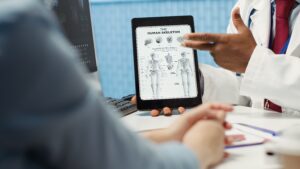Many aspiring physicians are wondering what to expect in medical school. There is no denying the fact that a Doctor of Medicine (MD) program is entirely different from an undergraduate degree program. The medical school curriculum is designed by keeping the academic needs, clinical knowledge, and advanced healthcare trends in mind.
Building a better understanding of the medical school curriculum will prepare applicants to familiarize with the course programs. The traditional four-year MD program offered at St. Kitts’ Windsor University School of Medicine is divided into two sections. Basic sciences program and Clinical sciences program. The MD curriculum is designed to provide students with basic medical concepts and hands-on practice during clinical rotations.
Let’s explore the traditional four-year medical school curriculum and what WUSOM students will learn during their academic journey.
Breakdown of MD Curriculum
Basic Sciences Curriculum
The Basic Sciences curriculum offered at Saint Kitts’ Windsor Medical University includes 13 systemic modules. The courses are designed to provide students with basic medical and clinical knowledge. Each course content is related to the other, providing students with strong knowledge of normal and abnormal medical processes.
MD 1 – Foundation of Normal Process
The MD curriculum includes the foundation of normal processes to help students understand the normal function and biochemical aspects of the human body.
Foundation of Normal Process comprises Fundamentals of Basic Sciences I, Musculoskeletal and Integumentary System I, Cardiovascular, Hematologic and Respiratory System.
Fundamental of Basic Sciences I
In this course, students will be introduced to more than 7 modules, including anatomy, embryology, physiology, cell biology, biochemistry, genetics, and histology. The module provides students with in-depth knowledge of how organs work normally, cell cycle, enzyme kinetics, homeostasis, fetal development and more.
Musculoskeletal and Integumentary System I
The module builds a stronger foundation of development and function of the musculoskeletal system. Students will learn the structure of tissues, and bones, connection between nerves and muscles. Students will also learn biochemical mechanisms, DNA replication, regulation of gene expression and the latest DNA technologies.
Cardiovascular and Hematologic System I
The module is mainly focused on the development of heart and blood vessels, hematopoiesis, histology of cardiac muscles, arteries, and veins. Students will know the physiological process of cardiac conduction, cardiac cycle, hemostasis, cardiac muscle metabolism and much more. The objective of this module is filled via active learning sessions so that students understand the abnormal processes of cardiovascular and hemostatic systems in clinical years.
Respiratory System I
This module develops basic understanding of respiratory system, histology of lungs, bronchi, alveoli, and associated pathologies and congenital abnormalities. The mechanism of breathing, lung volume, gas exchange, transport of oxygen and carbon dioxide, and other important processes. With this module, WUSOM students will learn how to diagnose and manage respiratory disorders.
Introduction to Clinical Medicine I
WUSOM students will get early clinical exposure with a system based modular curriculum. Courses such as Introduction to Clinical Medicine Series are taught in the Simulation Center of Windsor Medical University. The dedicated faculty use advanced simulation models to explain clinical scenarios and develop strong clinical examination concepts. They also use standardized patients for assessment to help students improve their concepts. Moreover, OSCE station is perfectly aligned with each system, allowing students to absorb the foundational knowledge.
The basic sciences curriculum covers many important courses to understand clinical aspects, such as patient assessment, history taking and examination and patient care. ICM courses also focus on building communication skills through group discussions during interactive lectures.
The basic sciences curriculum also includes Medical Genetics and Frontiers I.
MD 2 – Foundation of Normal Process II
Foundation of Normal Process II comprises 3 modules, GI and Hepatobiliary System I, Endocrine and Reproductive system I, Renal and Nervous system I.
GI and Hepatobiliary System I
The course gives basic understanding of normal structure and function of gastrointestinal and hepatobiliary system. With this module, students can polish their history taking, and physical examination of patients with GI problems. During lectures, students will discuss clinical cases, laboratory experience and prepare to work in clinical settings.
Endocrine and Reproductive System I
The course is dedicated to developing a clear understanding of endocrine glands, male and female reproductive systems, and embryonic development of endocrine glands. The module explains the mechanism of endocrine hormones, male and female reproductive physiology, body changes during puberty, metabolism of cholesterol, amino acids, and vitamins.
Renal and Nervous System I
The course is an integration of anatomy, physiology, embryology, histology and biochemistry, helping students to understand the normal and biochemical aspects of both systems.
In the Renal System I module, students will learn about kidneys, ureter, urinary bladder and urethra, physiological processes.
While the module of the Nervous System I covers anatomy and histology of nerves, development of the nervous system, and different causes of neural tube defects.
Introduction to Clinical Medicine II
The MD2 curriculum includes this important course to polish history taking and patient examination skills. WUSOM students will learn how to perform abdominal, thyroid, CNS, and female genital examination. Skills and clinical knowledge acquired through ICM 2 course will help students to understand complex clinical cases during clerkships.
Moreover, students will also take courses of neuroscience, and the principles of biomedical research.
MD 3 – The Foundation of Abnormal Process I
During this semester, students will take 3 modules, Fundamentals of Basic Sciences II, Neoplasia and Immune System, Cardiovascular and Hematologic System II.
Fundamentals of Basic Sciences II
As the name suggests, students will be introduced to the fundamentals of abnormal processes and microbiological aspects of different systems. Topics include, pharmacology, microbiology, pathology. From inflammation to pathological aspects, autonomic drugs, pharmacokinetics, pharmacodynamics, lab diagnosis of virus, bacteria, fungi, many important topics are covered in this module.
Neoplasia and Immune System
The module introduces different types and clinical aspects of neoplasia. It helps students understand the immune system, inflammatory and hypersensitivity response, and autoimmune disorders. The mechanisms of drug interaction are also discussed.
Cardiovascular and Hematologic System II
The goal of this module is to allow students to learn about cardiovascular pathology, abnormal cardiovascular conditions, and pharmacotherapy of cardiovascular disorders.
Introduction to Clinical Medicine III
The course provides foundational knowledge of abnormal human processes and develops advanced clinical skills. For instance, students will learn how to perform breast examinations on cancer patients. They will learn how to identify different complex cardiovascular disorders
MD 4 – The Foundation of Abnormal Process II
During this semester, WUSOM students will be introduced to 4 modules, Respiratory and Nervous System II, GI And Hepatobiliary System II, Endocrine And Reproductive System II and Renal And Musculoskeletal System II.
Respiratory and Nervous System II
The course covers pathological aspects of respiratory disorders, causes of infectious lung diseases, and neoplastic diseases. It also covers pharmacotherapy of respiratory disorders.
The central nervous system module focuses on pathological aspects of CNS disorders. Students will learn about treatment of neurodegenerative diseases, and microorganisms that cause CNS disorders.
GI & Hepatobiliary System II
The goal of gastrointestinal and hepatobiliary system II provides advanced knowledge of gastric disorders, salivary, esophageal, and intestinal disorders. It covers diagnosis and treatment of GI disorders and hepatobiliary systems such as pancreatitis, hepatic tumors, liver diseases and more.
Endocrine and Reproductive System II
This course focuses on building a deeper understanding of the pathology of endocrine glands, and reproductive systems. You will learn pregnancy related complications, hormonal disorders, thyroid and adrenal gland disorders.
Renal and Musculoskeletal System II
The module focuses on pathological aspects of the renal system, such as kidney, ureter, and urinary bladder. It also discusses microbiological aspects of musculoskeletal disorders.
Introduction to Clinical Medicine IV
The course is designed to develop patient assessment and examination skills. It focuses on eye and ear, abdominal, thyroid, female genital, renal and musculoskeletal examination of patients. Students will learn advanced diagnostic techniques by practicing on standardized patients and mannequins.
During MD 4, students will be taught the course of behavioral sciences.
MD 5 – Hospital Clerkship Preparation
The MD V curriculum offered at Caribbean Windsor medical university, solely focuses on preparing students for clinical rotations. Students will learn how to apply theoretical knowledge in real-life clinical scenarios.
Comprehensive Basic Sciences Review Course
Basically, this course is designed to review and assess students’ knowledge by taking summative and formative quizzes. WUSOM faculty arrange review sessions to analyze student’s ability to identify and diagnose and treat diseases on the basis of symptoms, and investigations.
Advanced Introduction to Clinical Medicine
It is an important course for MD students, helping them to prepare for clinical rotations. Students are taught how to present cases, perform medicine research, and build a problem-solving approach. Patients visit teaching hospitals to gain some hands-on experience.
Basic sciences students get the opportunity to take electives during the first two years of the MD program. The goal of electives in the WUSOM curriculum is to help students apply basic sciences knowledge into clinical situations.
Clinical Sciences Curriculum
Windsor University School of Medicine offers a Clinical Sciences program to prepare students for the challenging clinical settings. When WUSOM’s students complete basic sciences, they are required to complete 48 weeks of clinical rotations and 24 weeks of electives. The goal of the clinical curriculum is to provide students with a deeper understanding of different medical specialties.
Selective Rotations
Students will spend 12 weeks in mandatory selective rotations, twelve additional weeks of general medicine or surgical subspecialties.
4 weeks of clinical clerkship in Accident and Emergency
4 weeks of clinical clerkship in community and preventive medicine, such as family medicine, public health, rural medicine, etc.
4 weeks of clinical rotation to gain research experience by learning biomedical research writing, data analysis, manuscript writing and literature research methodologies.
Elective Rotations
Clinical Sciences students can choose different medical specialties to complete 12 weeks in elective clinical clerkships. Windsor University School of Medicine allows students to choose from a number of medical specialties. You can choose from cardiology, infectious disease, pathology, anesthesiology, radiology, dermatology – to name a few.
Students will also choose surgical specialties, including orthopedics, neurosurgery, plastic surgery, ENT and ophthalmology, and urology to complete elective rotations.
Complete Your MD Degree from WUSOM
Successful completion of the medical school curriculum will make you eligible to get an MD degree from Windsor Caribbean medical school and start your career in medicine. Contact WUSOM to get more details on the medical school curriculum and know your options.








